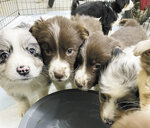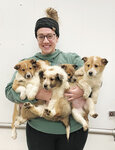

MARSHFIELD, Wis. — Brittany Schueller has always loved the animals in her life, whether they are the bovines on her family’s dairy farm or the dogs and cats that become the companions beloved by many.
“I have always been a huge animal person,” Schueller said. “With farming, you have to have a love for all things animal. I am also passionate about spaying and neutering and being a responsible pet owner.”
Schueller and her husband, Matthew, are partners with Matthew’s parents on their 1,000-cow Destiny Dairy near Marshfield.
In 2019, that long-time love of animals led Schueller to help become part of the solution to an overpopulation of dogs and cats.
“I got started with a local rescue, and from there, it just grew,” Schueller said. “My personality type is a go-getter. I want to always do more.”
That personality type led Schueller to begin doing rescue work on her own. Since last February, Schueller said, over 60 dogs have come through her house as rescues.
“To me, that is a win,” Schueller said. “Those 60 dogs are dogs that won’t reproduce. They are placed in appropriate homes where I know they will be well cared for. That makes me, and I would think everyone, happy.”
While most might think of rescues as being charitable causes that collect enough donations to keep them running, Schueller said that is not at all the case.
“I wouldn’t even want to think how much money, out of pocket, I have put into rescuing dogs,” Schueller said. “The adoption fees barely cover the vet work that is done and don’t begin to touch feeding them or any of the other expenses incurred.”
Despite the financial constraints, Schueller said she continues to do what she can as a rescuer because it is the right thing to do.
Many circumstances can cause a dog to need intervention. Unwanted litters of puppies or older dogs being released from breeders are the ones that cross paths with a rescue most often. Schueller said that they also see a number of dogs surrendered because of changes in their owner’s life.
“We don’t turn dogs down,” Schueller said. “When we get the call, we take them and then figure out where to place them after. Anything older than puppy is really hard to place, especially some of the breeder releases.”
Being located in central Wisconsin, Schueller works with many members of the Amish community and works to bridge that culture gap.
“Usually the litters of puppies Amish have are from their family dogs,” she said. “These dogs are usually good working dogs who are valued by the family for those abilities and traits.”
Many of the puppies Schueller sees are ones the Amish families have tried selling themselves. Schueller said that for the Amish community, selling puppies has become much harder than it used to be because of the rampant overpopulation of dogs.
Once those puppies outgrow the cute puppy stage, they become increasingly more difficult to place, creating a sense of urgency in Schueller’s rescue efforts.
“When they haven’t been potty trained by 12 to 16 weeks, it’s nearly impossible to place them,” Schueller said.
The power of social media plays a large role in Schueller’s efforts to place the dogs that find their way to her home. She relies on her connection to the farming community to help place the dogs bred to be working dogs on farms where their skills and personality traits would be valued.
“Lots of these puppies would make great farm dogs,” Schueller said.
In her efforts to place the puppies, Schueller continually works to build her network of other rescues from across the state.
“Because of the wide network and reach we have, we oftentimes will get people making requests for a particular breed of dog, and we can keep a lookout for those dogs,” Schueller said. “That’s always the best scenario — when there is an approved home waiting for a particular dog.”
That is not always the case, Schueller said, and dogs without those waiting homes either need to be placed in foster care or they stay with Schueller until a home is found through an application and approval process.
Some dogs require training and rehabilitation to set them up for success. Schueller takes it upon herself to prepare the dog for whatever situation it might go into.
“I have an older male dog, not housebroken; that is one of the hardest situations to take on,” Schueller said. “I have a foster home that will take him eventually and maybe even adopt him, but I need to lay that groundwork so that he can be successful with the foster family. I need to housebreak him and to teach him not to mark. It takes a lot of time and a lot of patience.”
Schueller’s work is not limited to dog rescue. She gets involved in helping to deal with feral and farm cats, working with farmers to trap cats and get them spayed or neutered and vaccinated to help control disease.
“It’s the nature of the farm; there is going to be cats, and they do have a job,” she said. “Being a farmer, I understand that. So, when I work with farmers, my goal is to get cats fixed and get them vaccinated. That controls the cat population for the farmer and keeps the cats healthier, and they are better able to do their job of hunting. And for the farmer, they know I have that understanding and background.”
Rescue work can be mentally taxing. Schueller said she fears the day she simply reaches the point of burnout.
“Sometimes I feel like it is a fine line we walk in the rescue world between helping solve the problem and enabling people to continue to create the problem,” Schueller said. “All I want is for the animals to be healthy and happy and well cared for. That is the priority.”
Comments
No comments on this item Please log in to comment by clicking here